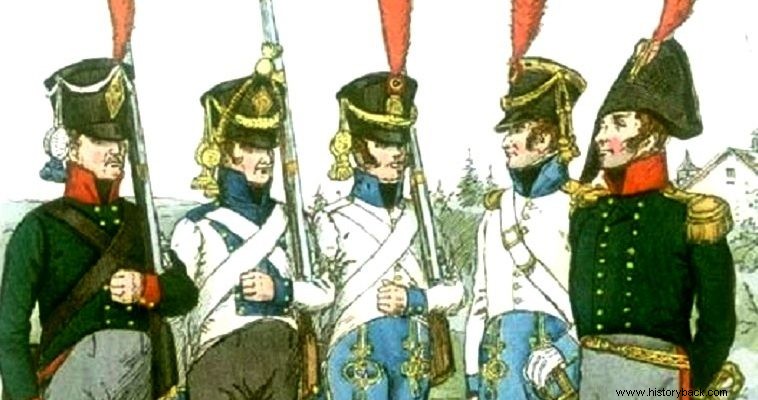
After his victory over Austria in 1805, Napoleon dissolved the Holy Roman Empire of the German Nation and founded the Confederation of the Rhine to which, gradually, all the smaller German states and states joined. Among these were the principalities of Waldeck, Reus, Lippe Bickenburg, Lippe Detmol, and Schwarzburg Sonderhausen and Schwarzburg Rudolstadt.
In 1808, by order of Napoleon, these six states had to provide a company of infantry for "the defense of the French coast against any English landing". On December 6, 1808 the six companies assembled at Metz, France. There the men were issued with French Model 1777 Charleville muskets and the men were trained under French infantry regulation. However, contrary to the typical organization of the French battalions of the time, the "Order of the Princes" , as it was called because the leaders of the small states from which its men came all bore the title of prince, it had six companies of musketeers. It did not have a company of snipers, nor a company of grenadiers.
Breaking his word, Napoleon ordered the battalion to be transported to the hell of Spain. The battalion was under the command of Schwarzburg Rudolstadt major von Brockenburg . The 1st Company, under Captain Ztienkopf, was joined by men from Schwarzburg Sonderhausen, the 2nd, under Captain Schilling, with men from Schwarzburg Rudolstadt, the 3rd Company, under Captain Meister, with men from Lippe Detmol, the 4th , of Capt. Kampe, with men from Lippe Bickenburg, Capt. von Zeidewitz's 5th with men from Reus, and Capt. Meyerhoff's 6th with men from Waldeck.
When it arrived in Spain, the Battalion organized from among its members a company of elite snipers, which was joined by the 15 best marksmen from each company. The Order received its baptism of fire on 6 May 1809 at the Battle of Torneja. There the Spanish had ambushed a French cavalry division. When Major Brockenburg heard the shots he rushed to the spot with his men. The Germans' next battle was fought in the fortified Spanish village of Gualda. There, attached to the brigade of the French Brigadier Genardi, the Battalion again charged with the lance and crushed their opponents. A total of 160 Spaniards were killed and 1,510 captured while three cannons were captured. The Battalion had four killed and 12 wounded in the said battle.
After this battle, however, the French assigned the Battalion more unpleasant roles, assigning it missions of escorting supply convoys, guarding and pursuing insurgents. The result was that the Order was decimated. According to a record of December 31, 1809, the Battalion was left with 281 men, from an original strength of 82O. Of the men 487 had been killed or died. The surviving men, along with reinforcements, then joined the 5th and 6th Regiments of the Confederation of the Rhine. They fought under Napoleon until 1813 when they turned against the French joining under Prussian-German command fighting against the French until the end.

